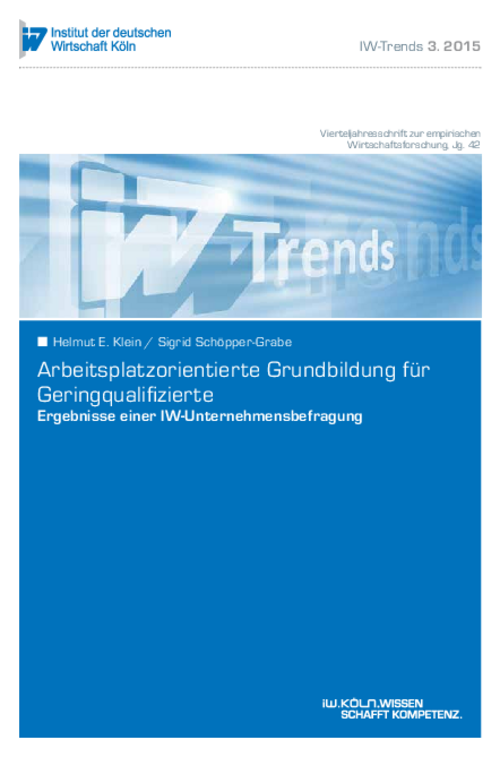Results of an IW Company Survey

Workplace-oriented Literacy and Numeracy Training for the Low-skilled
IW-Trends

Results of an IW Company Survey
The current discussion on securing an ongoing supply of skilled workers is increasingly drawing attention to the potential for training up low- and unskilled employees. However, the fact that most such workers lack not only a vocational qualification but even basic schooling makes upgrading their skills a special challenge. A promising and suitably targeted approach to career advancement for the low-skilled is workplace-oriented literacy and numeracy programmes. For the first time, a representative survey of companies carried out by the Cologne Institute for Economy Research (IW) provides information on the availability of in-company courses in literacy and numeracy for low-skilled workers and about the requirements for future labour market policy in this field. The survey was conducted on behalf of the Alpha-Grund Project, part of a national campaign to promote basic skills at the workplace, and of which the IW is a leading partner. The results show that about 80 per cent of companies employing low-skilled workers have offered at least one training measure for this target group within the last five years. In just under a third of these firms this was a measure to improve workplace-oriented training in the basic skills. With more than a third of companies seeing an increasing need for workplace-related support in literacy and numeracy for the low- and unskilled, this will continue to be an important aspect of companies’ personnel development.

Helmut E. Klein / Sigrid Schöpper-Grabe: Arbeitsplatzorientierte Grundbildung für Geringqualifizierte – Ergebnisse einer IW-Unternehmensbefragung
IW-Trends

More on the topic

Further training needs of the automotive industry in transformation
Due to the ecological and digital transformation, significant parts of the German economy, particularly the industrial sector, are currently undergoing a transformation. This development also extends to the automotive sector, which occupies a vital position in ...
IW
The Increasing Importance of Literacy Courses and Further Training for the Low-skilled
Digitalisation and the demographic transition are presenting companies with ever new challenges. This puts pressure on firms to be in a process of constant change, a phenomenon reflected in the growing demands they put on their low-skilled employees.
IW